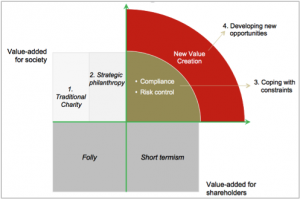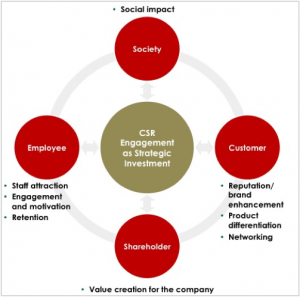Social Advantage – CSR as Competitive Advantage
It was in a nicely equipped library of an elementary school, located in a small town in Anhui province. A group of visitors brought new books and sports equipment to the school, and were playing with children like a big family.
This is not just another project run by NGOs. Actually, the visitors are dealers and car-owners of an international premium carmaker, taking care of on-going support and maintenance after the carmaker built an interactive multimedia classroom in the school.
“When car owners become active volunteers of our CSR projects, they are more attached to our brand, and likely will be our repeated buyers”, said one manager.
This is not the only case we have seen, that companies can build brand loyalty while contributing to the society, through well-designed Corporate Social Responsibility (CSR) programs.
As a matter of fact, another premium carmaker is planning to launch a program, which will motivate dealers to initiate and execute CSR projects in local community, by providing financial support and charity sector resources to dealers.
By engaging business partners and consumers in their CSR programs, companies have successfully created value for their shareholders.
Even further, our research shows a few CSR forerunners are going beyond charity, and start to integrate CSR into their core business strategies in China to develop new business opportunities.
An example in auto industry is Volkswagen’s “think blue” project, where the company is calling for all citizens to spread or practice “energy conservation” concept, in various ways such as post message on “eco-friendliness” topic, buy a VW TSI+DSG car, or join VW road show. In return, the company will lighten up an “eco-friendly” blue avenue in Shanghai. While advocating “energy conservation”, the “think blue” project also serves as an effective promotional tool for VW’s “eco-friendly” car series.
Like in most developing markets, CSR in China is reinventing its “business model”. We think today’s CSR programs can be classified into four types, from traditional charity, strategic philanthropy, coping with constraints, to developing new opportunities. While all serve good causes, they can bring increasing value to company shareholders.
Chart: Four stages of CSR with increasing value for shareholders
- “Traditional charity” typically involves donation or other form of activities where limited resources outside of the CSR department are engaged. While in “strategic philanthropy” stage, business partners, consumers or employees are part of the program, with brand loyalty or employee retention greatly strengthened through CSR.
- In “coping with constraints” stage, companies set out a set of code of conduct to comply with the law and minimize risks. A few leading companies have re-visited supply chain to improve energy efficiency and minimize negative impacts.
- “Developing new opportunities” is the most innovative stage where new markets, products, business models or sales & marketing tools are created. Those forerunners are creating value for both the society and shareholders through CSR programs.
The forerunner examples, however, are few. In China, the prevailing format is still very traditional, such as donation. Also, in majority of the cases, CSR is seen as a pure cost center with some positive impact on company image improvement.
For example, our research in auto industry CSR shows that even as one of the most active and innovative groups, few auto giants have fully leverage CSR platform to create business value.
Chart: Major CSR programs in auto industry in China
At VA, we believe companies can bring more to the civil sector than financial contribution. In return, higher value to the company can be realized if they position CSR as a strategic investment. Inspired by the encouraging early results, we’re not only partnering with pioneering companies to move their programs forward, we will also promote broader cross-sector cooperation through initiatives such as “phoenix 2016”.
China is changing, so is CSR. We are keen to see more companies, multinational or local, to develop their unique competitive edge by smart CSR investment and better project portfolio programming. Truly, civil sector will not be the only beneficiary of CSR; companies can thrive, too.
Chart: Benefits to Society and Business Through CSR investments



